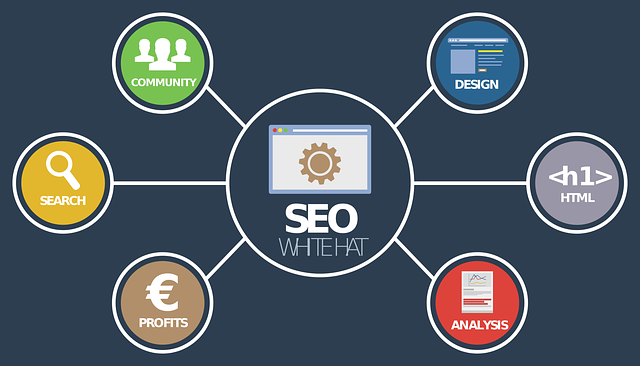In today’s digital age, local SEO has become an essential part of any effective digital marketing strategy. Whether you’re running a small business with one storefront or managing multiple locations,
optimizing your website and online presence for local search is critical to attracting new customers and growing your business. In this blog post, we’ll discuss the importance of local SEO and provide some strategies for boosting your local search rankings.
What Is SEO?

SEO Stands for “Search Engine Optimization”. It is the practice of improving the visibility and ranking of a website or web page in search engine results pages (SERPs) like Google, Bing, and Yahoo.
In Simple terms, SEO involves making changes to your website and creating content that makes it easier for search engines to understand what your website is about and determine its relevance to specific search queries.
The goal of SEO is to increase the quantity and quality of organic traffic to your website, which can lead to higher visibility, more leads, and ultimately, more conversions and revenue.
The complex and ever-changing field
Some common SEO techniques include optimizing website content and structure, conducting keyword research and using relevant keywords in your content, building backlinks from other reputable websites, improving website loading speed, and ensuring your website is mobile-friendly.
SEO can be a complex and ever-changing field, but the basics are relatively simple. Create high-quality content that is relevant to your audience and optimize your website and content to make it easy for search engines to find and understand.
In this article, we’ll touch upon the following:
What is Local SEO?
What Does Local SEO Look Like?
Benefits of local SEO
What is the importance of local SEO for small businesses?
Do I need Local SEO?
How can I improve my local SEO?
What is local SEO vs. organic SEO?
What are the different types of local SEO?
How important are backlinks to local SEO?
What is Local SEO?
Local SEO is the practice of optimizing your website and online presence for location-based searches. This includes a range of strategies, from optimizing your website for local keywords and creating local content to managing your Google My Business Profile and building local citations.
The goal of local SEO is to increase your visibility in local search results, making it easier for potential customers to find and connect with your business.
Why is Local SEO Important?

There are several reasons why local SEO is important for businesses of all sizes:
- Increased Visibility: By optimizing your website and online presence for local search, you can increase your visibility in local search results, making it easier for potential customers to find your business.
- Improved user experience: Local SEO can also improve the user experience for your website visitors, making it easier for them to find the information they need and take action, such as making a purchase or booking an appointment.
- Increase in website traffic: By ranking higher in local search results, you can drive more traffic to your website, which increases your chances of converting visitors into customers.
- Greater Trust and Credibility: By appearing in local search results, you can establish greater trust and credibility with potential customers, who are more likely to trust businesses that have a strong online presence.
Strategies to Increase Your Local Search Ranking
Now that you understand the importance of local SEO, let’s explore some strategies for boosting your local search rankings:
- Optimize your Google My Business profile: Your Google My Business (GMB) profile is one of the most important factors in local SEO. Make sure your profile is complete and up-to-date, including your business name, address, phone number, website, hours of operation, and photos.
- Build local citations: Local citations are online mentions of your business name, address, and phone number (NAP) on other websites. The more high-quality citations you have, the more trustworthy and authoritative your business will appear to search engines.
- Create Local Content: Creating content relevant to your local audience can help you rank higher in local search results. Consider creating blog posts, videos, and other content that highlight local events, news, and trends.
- Optimize your website for local keywords: Make sure that your website includes local keywords in your page title, meta description, and content. This can help you rank higher in local search results for relevant keywords.
- Get customer reviews: Customer reviews are an important factor in local search ranking. Encourage your customers to review your Google My Business profile and other review sites.
What Does Local SEO Look Like?
Local SEO is about optimizing your online presence for location-based searches. By using tactics like optimizing your GBM profile, building local citations, creating local content, and optimizing your website for local keywords.
To play the game, and ensure your NAP(name, address, phone number) is consistent, you can improve your visibility and credibility in local search results and attract more local customers.
For example,
if someone searches for “coffee shops near me,” local SEO helps ensure that local coffee shops appear in the search results.
Benefits of local SEO

Local SEO is especially important for small and local businesses that rely on foot traffic or customers in their geographic area. By optimizing your online presence for local searches, you can improve your visibility and attract more local customers.
One of the key benefits of local SEO is that it can help you compete with larger businesses that have a national or global presence.
By focusing on local search results, you can target customers who are specifically looking for businesses in your area, rather than trying to compete with bigger businesses on a national or global level.
Local SEO is also important for mobile searches. Many people use their smartphones to search for local businesses while on the go, so having a strong local SEO strategy can help you attract more mobile customers.
In addition to optimizing your website and online directories for local search results, you can also use social media to improve your local SEO.
By creating social media profiles for your business and engaging with local customers on social media, you can improve your visibility and credibility in local search results.
- Local SEO targets specific searches for your business or location.
- It’s cheaper than traditional advertising methods.
- Free local SEO techniques leave you with more budget for other strategies.
- Local searches want information on local businesses.
- Having your contact details on your website and trusted directories will help promote sales.
Finally, it’s important to regularly monitor and update your local SEO strategy.
What is the importance of local SEO for small businesses?

In the past, local businesses faced difficulties online as national brands dominated, and people preferred traditional approaches over online spending. However, in 2014, Google introduced the Pigeon upgrade, which allowed local companies to compete regionally for search results.
Local SEO emerged as a solution, helping businesses connect with their targeted nearby audience. The best part is its ease of optimization—simply backlink to local event sites and use location-specific phrases in keywords to expand the reach based on the region. As a result, businesses achieve higher ranking positions and attract more foot traffic to their stores.
- Enhanced Online Visibility: Local SEO increases the visibility of small businesses in search engine results, making them more accessible to local customers.
- Targeted Local Audience: By optimizing for local SEO, small businesses can attract potential customers who are specifically looking for products or services in their area.
- Increased Website Traffic: Implementing local SEO tactics leads to a rise in organic website traffic, as more relevant local customers find the business online.
- Improved Online Reputation: Local SEO helps small businesses build a positive online reputation by encouraging satisfied customers to leave reviews and feedback.
- Better User Experience: Local SEO focuses on providing relevant and valuable information to local customers, resulting in an improved user experience on the website.
- Mobile Optimization: Local SEO ensures that small business websites are mobile-friendly, catering to the increasing number of mobile users.
- Beat Competitors: Utilizing local SEO strategies can help small businesses outperform their competitors in local search rankings.
- Cost-Effectiveness: Local SEO is often more cost-effective than traditional advertising methods, making it a suitable option for small businesses with limited budgets.
- Stronger Community Connections: Local SEO allows small businesses to connect with their local communities, fostering stronger relationships and customer loyalty.
- Drive Foot Traffic: Optimizing for local SEO can lead to an increase in foot traffic to physical stores, boosting local sales and business growth.
- Local Partnerships: Local SEO efforts can attract partnerships with other local businesses, expanding the small business’s reach and customer base.
- Insights into Customer Behavior: Local SEO analytics provide valuable insights into local customer behavior, enabling small businesses to refine their marketing strategies.
- Long-Term Impact: Establishing a strong local online presence through SEO can have a lasting impact on the small business’s success.
- Adaptation to Voice Search: Local SEO enables small businesses to adapt to the growing trend of voice search and stay relevant in changing consumer behavior.
- Global Reach with Local Focus: Local SEO allows small businesses to maintain a global online presence while still catering to the unique needs of their local audience.
Do I need Local SEO?
Yes, if you are a small business or a company that primarily serves a local or regional audience, then you definitely need Local SEO. SEO is essential for businesses that want to improve their online visibility and attract customers within their local area.
In this digital age, where consumers increasingly rely on the internet to find products and services, local businesses must capitalize on Local SEO to thrive in the competitive marketplace.
One of the key benefits of Local SEO is its ability to connect businesses with their specific local audience. By optimizing for local search, businesses can reach potential customers who are actively looking for products or services in their vicinity.
This targeted approach ensures that marketing efforts are directed toward those most likely to convert into customers.
How can I improve my local SEO?

To improve your local SEO, follow these steps:
- Google My Business: Create and optimize your GMB listing to ensure accurate business information.
- Local Keywords: Use location-specific keywords in website content and meta tags.
- Online Directories: List your business on popular local directories like Yelp and Yellow Pages.
- NAP Consistency: Ensure consistent Name, Address, and Phone Number across all platforms.
- Customer Reviews: Encourage happy customers to leave positive reviews on your GMB page.
- Local Citations: Get mentioned on local websites or blogs to boost credibility.
- Mobile Optimization: Ensure your website is mobile-friendly for on-the-go users.
- Local Content: Create content related to your area to attract local visitors.
- Social Media: Engage with the local community on social platforms.
- Local Backlinks: Obtain backlinks from reputable local websites to improve authority.
- Local Schema Markup: Use schema markup to provide relevant local information.
- Local Events: Participate in or sponsor local events to gain visibility.
- Google Maps: Embed a Google Map with your location on your website.
- Local Keywords in URLs: Include location keywords in your page URLs.
- Competitor Analysis: Analyze local competitors to identify opportunities.
By implementing these strategies, you can enhance your local SEO and attract more local customers to your business.
What is local SEO vs. organic SEO?
Local SEO and organic SEO are two distinct strategies for improving search engine visibility.
Local SEO focuses on optimizing a business’s online presence to target specific local audiences.
In contrast, organic SEO aims to increase overall visibility and attract a broader audience regardless of location.
Local SEO employs tactics like Google My Business and local citations to rank higher in local search results.
On the other hand, organic SEO relies on content optimization, link building, and keyword research to improve rankings across the board.
While both strategies aim to boost online visibility, they cater to different audience segments and serve unique purposes.
What are the different types of local SEO?

There are several types of local SEO strategies to enhance local visibility and attract nearby customers.
- On-Page Optimization: Tailor website content and meta tags with location-specific keywords.
- Google My Business (GMB) Optimization: Optimize your GMB listing with accurate business information.
- Local Citations: Get mentioned on local directories, websites, and platforms.
- Online Reviews and Reputation Management: Encourage positive reviews and respond to customer feedback.
- Local Link Building: Obtain backlinks from local websites to boost local authority.
- Local Content Marketing: Create relevant content related to your local area.
- Mobile Optimization: Ensure your website is mobile-friendly for on-the-go users.
- Local Schema Markup: Use schema markup to provide relevant local information.
- Local Social Media Engagement: Interact with the local community on social platforms.
- Local Events and Sponsorships: Participate in or sponsor local events to gain visibility.
By implementing these diverse local SEO tactics, businesses can effectively reach their nearby target audience and thrive in their local markets.
How important are backlinks to local SEO?
Backlinks are indeed important for local SEO, although their significance might not be as pronounced as in organic SEO. Local SEO primarily revolves around proximity and relevance signals, such as Google My Business (GMB) optimization, local citations, and customer reviews.
However, backlinks can still play a role in boosting a local business’s online visibility and authority.
Local backlinks, specifically from reputable local websites and directories, can contribute to your business’s credibility and relevance in the local market. When local websites link to your business, search engines may view your site as more trustworthy and relevant to the local community.
These backlinks can also help improve your business’s authority and increase the likelihood of ranking higher in local search results.
It’s essential to strike a balance between various local SEO strategies, including backlinks, to create a comprehensive and effective local SEO campaign.
Conclusion

In conclusion, local SEO is a vital aspect for small businesses or companies targeting a local or regional audience. It enables businesses to connect with their nearby customers and improve online visibility in local search results. Local SEO strategies, such as Google My Business optimization, local citations, on-page optimization, and managing online reviews, play a significant role in attracting nearby customers and increasing foot traffic to physical stores.
While backlinks are essential for overall SEO success, they may have a relatively smaller impact on local SEO compared to other factors like proximity and relevance signals. Therefore, businesses should focus on a well-rounded local SEO approach that encompasses various tactics to enhance their presence in the local market and stand out among competitors.
By prioritizing local SEO efforts and maintaining accurate business information, engaging with the local community, and optimizing for location-specific keywords, businesses can leverage the power of local search to grow their customer base and thrive in their local markets. Local SEO offers an opportunity for small businesses to compete effectively with larger corporations and make a significant impact on their success in the digital era.
